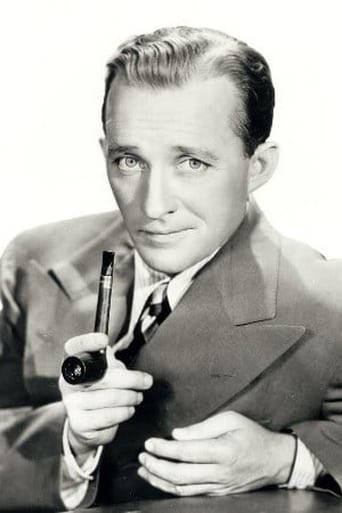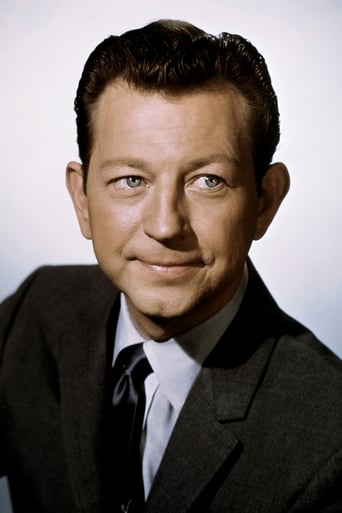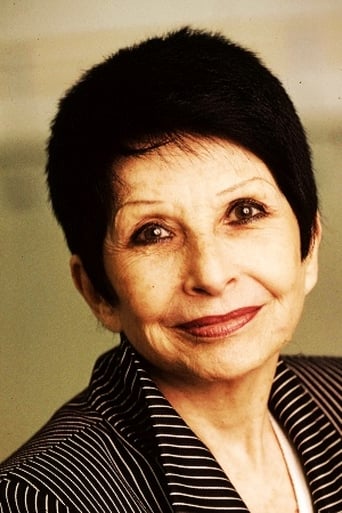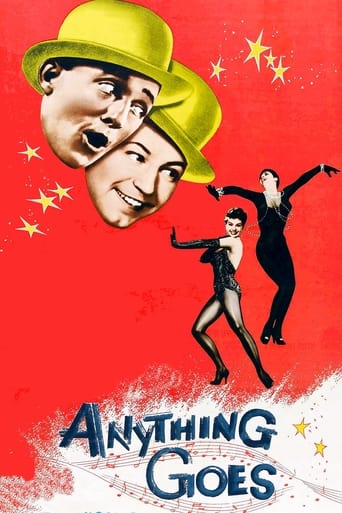
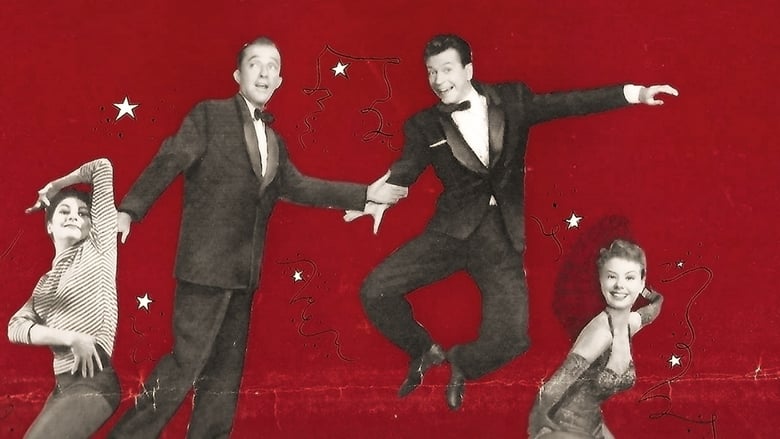
Anything Goes (1956)
Bill Benson and Ted Adams are to appear in a Broadway show together and, while in Paris, each 'discovers' the perfect leading lady for the plum female role. Each promises the prize role to the girl they selected without informing the other until they head back across the Atlantic by liner - with each man having brought his choice along! It becomes a stormy crossing as each man has to tell his 'find' that she might not get the role after all.
Watch Trailer
Cast


Reviews
Good concept, poorly executed.
One of the worst ways to make a cult movie is to set out to make a cult movie.
Great story, amazing characters, superb action, enthralling cinematography. Yes, this is something I am glad I spent money on.
Actress is magnificent and exudes a hypnotic screen presence in this affecting drama.
After years of knowing this was on YouTube, I finally watched this there. Bing Crosby had previously starred in the 1936 filmed version of Cole Porter's Anything Goes which kept most of the book. This version changes all that, only the best known songs are intact, the rest being new ones written by someone else. Donald O'Connor-who had previously appeared with Bing as a kid in Sing You Sinners-is his co-star and does quite well with him as do leading ladies Mitzi Gaynor and Jeanmaire. The last one is someone I didn't know about before and she's good with her talents being displayed here as is Ms. Gaynor. By the way, Ms. Gaynor and Mr. O'Connor had appeared previously as siblings in There's No Business Like Show Business so it must have partially shocked audiences at the time to see them as lovers here! In summary, I really enjoyed this other filmed version of Anything Goes so that's a high recommendation!
'Anything Goes' has always been one of my favourite Cole Porter musicals. The songs are some of his most memorable and catchy (with a title song that almost everybody knows most likely) and the lyrics some of his cleverest.The first screen adaptation, from 1936 also featuring Bing Crosby, wasn't perfect and wasn't a completely faithful treatment of the stage musical, with the risqué naughtiness of the lyrics being toned down. There was plenty to enjoy however, as the cleverness of the script wasn't lost and the performances across the board were terrific. While there were liberties taken with that version, they were nothing compared to this second adaptation from 1956 which is so loosely adapted that it's almost unrecognisable.It is watchable certainly. Apart from the over-reliance on medium shots, the Technicolor is ravishing and visually in terms of editing it is slicker than the earlier version. Production values generally are more lavish without being overblown. The Roland Petit-choreographed ballet danced by Jeanmaire is very impressive. Of the performances, the standouts are Donald O'Connor and Mitzi Gaynor. O'Connor plays his role with such endearing zest and Gaynor is even more of a joy. Phil Harris makes the most of a thankless role that doesn't add as much as it had potential to.Bing Crosby however, despite singing an absolute dream, looks nowhere near as relaxed as in the earlier version and seems disinterested and like he'd rather be someplace else. Jeanmaire dances impressively, but shows her limitations as a singer and plays her role far too coldly. The direction is heavy-footed and really does lack the lightness of touch needed, while the script, which is actually very clever and funny in the source material, is as flat as the soggiest of cucumber sandwiches.One will say that nobody watches a musical for the story. In some way, that is true, because there are a lot of musicals where the stories are the weak point and are more than compensated by everything else. In this case however, it is not so easy to forgive due to very leaden pacing, a too long and over-stretched length and too many pointless additions, even thinner, sillier and flimsier than in the 1936 film. The last thirty minutes feel rushed and the ending on the tacky side.While film musicals and anything should be judged on their own terms, the treatment of Porter's timeless songs with the updated arrangements making the songs lose some of their infectiousness and the lyrics are even blander and even less naughty than in the earlier film adaptation to the extent that it doesn't feel like Porter at all. The songs themselves are great, it's just that the arrangements don't do them justice (with the sole exception of "De-Lovely") and there should have been much more of them. The additional songs not written by Porter are too at odds with Porter's style and are nowhere near as inspired, "Ya Gotta Give The People Hoke" in particular is an embarrassment and should have been left chopped up on the editing room floor.All in all, flat second adaptation of a classic Cole Porter musical. Before seeing this, 'Can-Can' was the weakest screen adaptation of any of Porter's work, as of now this dethrones it for that dubious distinction. 4/10 Bethany Cox
The only thing this really has in common with the hit 1934 Broadway musical is the title, a few of the songs, and its main setting on a ship. But gone is the main story, replaced with the type of "Let's put on a show!" movie musical that audiences have seen over and over again. Other than the abbreviated 1954 Colgate Comedy Hour version of the show, there has not really been a remotely faithful record of this, the 1936 film altered to make Ethel Merman's character more of a sidekick than leading lady.This appears to have been influenced by the success of "White Christmas", made just two years prior in VistaVision, and a huge success in spite of its mediocrity. Both are excuses for the catalog of songs from Broadway greats Irving Berlin and Cole Porter, and both fall on their faces because of flat stories and weak structures. Instead of Danny Kaye, comic man Donald O'Connor comes in, paired with Bing Crosby as part of a song and dance team on the look-out for the star of their next big show. O'Connor instantly goes after perky Mitzi Gaynor (a definite Vera-Ellen look-alike) while Crosby sets his eyes on the French Zizi Jeanmaire, fresh from appearing on Broadway in the short-lived "The Girl in Pink Tights". Both promise the leading role to their discovery without realizing that the other has done the same thing. And that's the plot in a nutshell, boys.If some lesser Irving Berlin songs were spruced up for Danny Kaye to perform to comic effect in "White Christmas" weren't obnoxious enough, here we get the outlandishly corny "Ya Gotta Give The People Hoke", not even a Cole Porter song, written by Paramount regulars Jimmy Van Heusen and Sammy Cahn. The title alone sums up how crushingly bad it is. O'Connor gets something called " You Can Bounce Right Back" which is a bit better, resembling his Irving Berlin solo "What Chance Have I With Love?" from "Call Me Madam" and Debbie Reynolds and Bobby Van's balloon dance from "Small Town Girl" in its execution and staging. The dance numbers here seem to go out of their way to prove the lyrics for "Choreography" from "White Christmas" and these numbers end up being just as outrageously pretentious as that disappointed number was.As for the few Cole Porter songs left, they are mostly from the original "Anything Goes", but are mostly utilized as big production numbers rather than songs with plot point. Zizi sings "I Get A Kick Out Of You" partially in French, the staging of which left me totally cold, while Mitzi Gaynor gets a rather badly staged version of the title song. Fortunately, her overblown performance here didn't stop her from getting her greatest triumph, playing Nellie in the movie version of "South Pacific". All four have duets with "You're the Top", and that too isn't as memorable as versions of that song as seen on stage. The finale of "Blow, Gabriel, Blow!" tries to make up for the mediocrity that preceded it, but like the others, it lacks the heart, making the entire proceedings a major let-down.For a bit of comic relief (and a little drama), there's funny man Phil Harris as Gaynor's father who has a major drinking problem, supposedly supposed to represent the character of Moonface Martin from the original. But intended pathos with him end up becoming a bit forced, and the entire story suffers from the studio's lack of faith in the titled source. Maybe with the return of the movie musical in today's film world being attempted a bit more, we'll one day get the ultimate film version of the 80 year old show, and wouldn't that be ironic? It's not to be found in the two films Paramount did with Crosby, and the T.V. version, while very good, is not nearly complete.
When the saucy lyrics of the title song are dumbed down ("four letters words" becomes "three letter words"), Reno Sweeney isn't even a character in the story, and additional (and lousy) songs are added in place of Cole Porter's music, what in hell was the point to this mess? Crosby and O'Connor are starring in a new show and each hires a leading lady (Gaynor and Jeanmaire). The cute "twist" is that each guys falls for the other's lady. It takes places on an ocean liner, but that's about all that's kept from the original Broadway show.There's a lame subplot about a tax-evading daddy (Phil Harris) and other cast members gets credit but nothing to do (Richard Erdman, Dorothy Neumann, Kurt Kaznar) and other familiar faces can be spotted (Nancy Kulp, Ruta Lee, Bess Flowers, Marcel Dalio).In its own terms, Crosby, O'Connor, and Gaynor are all fine but nothing really works. The storyline is a mess and Zizi Jeanmaire is a cold fish disaster, dancing some ballet stuff and faking the rest of the dances badly. She appeared in a handful of films and Broadway shows to no great success.Stick with Merman and the original film version.


